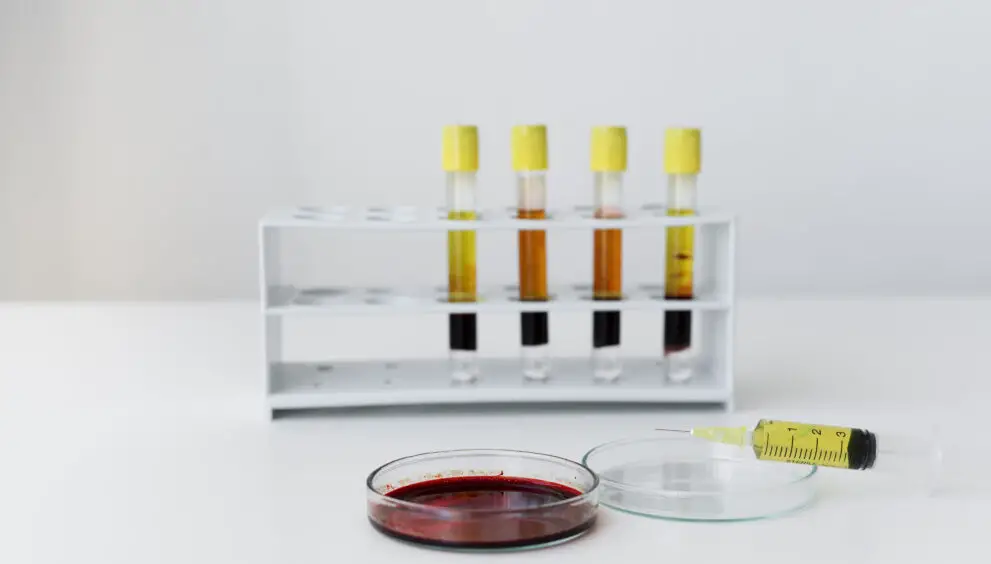Coping with alcohol addiction can be difficult, but achieving an accurate diagnosis is the initial stride toward recovery. This article will delve into alcohol addiction and provide a comprehensive overview of the various effective Tests for Alcoholism available for diagnosing and assessing this debilitating disorder.
Whether seeking answers for yourself or someone you care about, this resource is designed to shed light on the path toward a healthier, alcohol-free life.
The Role of Blood Tests in Diagnosing Alcoholism
Health and Human Services recognize the crucial role of blood tests in diagnosing alcoholism, providing healthcare professionals with valuable insights into an individual’s alcohol intake patterns.
These tests offer a means to detect specific biomarkers that indicate alcohol-related damage to the body, such as liver enzymes and carbohydrate-deficient transferrin.
The healthcare professional must consider various factors, such as the timeframe of alcohol consumption, individual metabolism, and potential confounding variables.
Psychological Assessment Tools for Alcohol Use Disorders
American Addiction Centers recognize the significance of psychological assessment tools in identifying and understanding the complex patterns associated with unhealthy alcohol use.
These assessment tools delve into various psychological factors contributing to alcohol addiction, such as motivations, triggers, and underlying mental health conditions.
This knowledge is invaluable in designing an effective intervention and personalized treatment plan that address the underlying causes of alcohol abuse.
Screening Questionnaires: Identifying Alcohol Abuse and Dependence
Screening tests are valuable tools for identifying alcohol abuse by assessing the frequency and quantity of alcohol intake through structured questionnaires designed to detect unhealthy alcohol use.
- The AUDIT (Alcohol Use Disorders Identification Test)
The AUDIT is extensively employed as a screening tool to identify individuals who may have an alcohol use disorder by assessing various aspects of their alcohol consumption patterns and the associated consequences, such as how many drinks they have daily, weekly, and monthly.
It consists of multiple questions that comprehensively assess alcohol consumption patterns, dependence symptoms, and the potential risks and harms associated with alcohol use.
2. CAGE Questionnaire

The CAGE questionnaire is a brief assessment tool utilized to evaluate alcohol dependence, named after its four fundamental questions:
- Have you ever experienced the desire to Cut down on your alcohol consumption?
- Has criticism of your drinking ever Annoyed you?
- Do you feel Guilty about your drinking?
- Have you ever had a drink as an Eye-opener first thing in the morning?
3. MAST (Michigan Alcohol Screening Test)
The MAST is a self-report questionnaire widely used to evaluate an individual’s alcohol consumption patterns and the potential consequences of their drinking.
It consists of 22 questions that people answer to assess various aspects of alcohol use, including the frequency, quantity, and harmful effects of drinking.
4. SMAST (Short Michigan Alcoholism Screening Test)
The SMAST is a brief assessment tool to screen for potential alcohol-related problems and identify individuals at risk for alcoholism. It consists of 13 questions and focuses on patterns of alcohol intake, consequences, and dependence symptoms.
5. T-ACE Questionnaire
The T-ACE questionnaire is a screening tool commonly used to identify prenatal alcohol exposure and potential alcohol-related risks during pregnancy. It consists of four questions that assess alcohol consumption, tolerance, and any concerns about the individual’s alcohol use during pregnancy.
6. AUDIT-C
The AUDIT-C is a compact screening instrument employed to evaluate patterns of alcohol consumption and detect individuals who might be susceptible to alcohol-related issues. It comprises three targeted questions addressing the frequency and amount of alcohol consumed.
7. CRAFFT Screening Tool
The CRAFFT screening tool is extensively utilized for evaluating alcohol and substance use in adolescents, with the objective of identification. Comprising six questions, this assessment tool examines behaviors, consequences, and risk factors linked to alcohol and drug usage within this age group.
8. DAST (Drug Abuse Screening Test)
The DAST is a widely employed screening test to detect substance use disorders in adults, with a particular emphasis on drug use. Comprised of 20 questions, this tool evaluates the intensity of drug usage, the resulting repercussions, and potential indications of dependence or addiction.
9. AUDIT-P
The AUDIT-P is an adapted variant of the AUDIT questionnaire designed explicitly for primary care environments. With a condensed format of just three questions, individuals can quickly provide answers regarding their alcohol intake. This streamlined approach enables swift identification of potential alcohol-related issues and facilitates the determination of suitable interventions.
10. SASSI (Substance Abuse Subtle Screening Inventory)
The SASSI is an all-encompassing assessment tool meticulously crafted to identify subtle indicators of a substance use disorder. By employing a series of questions, it thoroughly evaluates different dimensions of an individual’s behavior, attitudes, and psychological traits, offering valuable insights into the potential existence of a substance use disorder.
Imaging Techniques
As highlighted by the National Institute on Drug Abuse, imaging techniques provide a means to observe the effects of alcohol on the brain, thereby illuminating its influence on well-being and cognitive processes. Through MRI and PET scans, structural and functional alterations in the brain can be visualized, enriching our comprehension of the neurological ramifications caused by alcohol.
Genetic Testing for Alcoholism
This testing offers valuable insights into the interaction between genetic predispositions and the risk of alcohol-related problems, helping to identify and support pregnant women susceptible to alcohol-related issues.
Behavioral Tests: Evaluating Alcohol-Related Behaviors and Impairments
Behavioral assessments assess behaviors associated with alcohol abuse, offering insights into individuals’ negative experiences or adverse consequences of their drinking patterns.
Also, these tests help analyze if a person who drinks a lot felt bad or made people annoyed because of their alcohol problems. Therefore, a health care professional will diagnose alcohol use disorder based on behavioral tests.
Liver Function Tests
Liver function tests are essential for assessing alcohol-induced liver damage, particularly in individuals at high risk due to excessive drinking. These tests provide valuable information about liver health, enabling early detection and monitoring of liver disease associated with alcohol consumption.
Biomarkers of Alcohol Intake
Biomarkers of alcohol abuse offer novel approaches for detecting and assessing drinking habits, aiding in developing personalized treatment options, particularly in primary care settings.
Dual Diagnosis Assessment
Dual diagnosis assessment plays a crucial role in addressing the co-occurrence of mental health disorders and problematic drinking, enabling healthcare professionals to identify individuals experiencing guilt and symptoms of both alcohol use disorders and mental health conditions.
Self-Report Measures
Self-report measures, such as an interactive self-test, emphasize the importance of honesty when screening for alcoholism. This enables individuals to self-assess their drinking habits accurately to their healthcare provider.
Conclusion
The World Health Organization supports these evidence-based approaches to identifying alcoholism, including recognizing the “eye-opener” behavior and assessing the frequency of annoyance caused by others’ comments on drinking habits.
The guide also explores the role of medications in treating alcohol use disorders and addresses the everyday morning urge to drink first thing.
Encouraging self-assessment and highlighting the potential risks associated with certain drugs equips healthcare professionals and individuals with the knowledge to address alcohol-related concerns effectively.
You can also read: Evil Eye Quotes to Remove Very Bad Vibe




